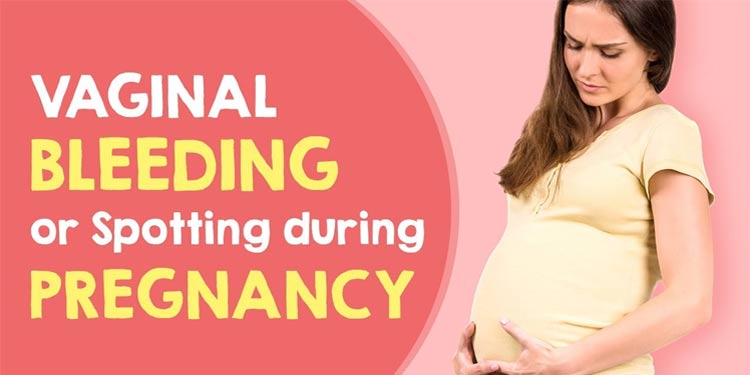
Does bleeding during pregnancy always mean that there is a problem?
Vaginal bleeding during pregnancy has many causes. Some are serious, whereas others are not. Bleeding can occur early or later in pregnancy. Bleeding in early pregnancy is common. In many cases, it does not signal a major problem. Bleeding later in pregnancy can be more serious. It is best to contact your obstetrician-gynecologist (ob-gyn) or other health care professional if you have any bleeding at any time during pregnancy.
How common is bleeding during early pregnancy?
Bleeding in the first trimester happens to about 15–25% of pregnant women. Light bleeding or spotting can occur 1–2 weeks after fertilization when the fertilized egg implants in the lining of the uterus. The cervix may bleed more easily during pregnancy because more blood vessels are developing in this area. It is not uncommon to have spotting or light bleeding after sexual intercourse or after a Pap test or pelvic exam.
What problems can cause bleeding during early pregnancy?
Problems that can cause bleeding in early pregnancy include infection, early pregnancy loss, and ectopic pregnancy.
What is early pregnancy loss?
Loss of a pregnancy during the first 13 weeks of pregnancy is called early pregnancy loss or miscarriage. It happens in about 10% of known pregnancies. Bleeding and cramping are signs of early pregnancy loss. However, about one-half of women who have a miscarriage do not have any bleeding beforehand.
If you have had an early pregnancy loss, some of the pregnancy tissue may be left in the uterus. This tissue needs to be removed. You can allow the tissue to pass naturally, or it can be removed with medication or surgery
What is an ectopic pregnancy?
An ectopic pregnancy occurs when the fertilized egg does not implant in the uterus but instead implants somewhere else, usually in one of the fallopian tubes. If the fallopian tube ruptures, internal bleeding can occur. Blood loss may cause weakness, fainting, pain, shock, or even death.
Sometimes vaginal bleeding is the only sign of an ectopic pregnancy. Other symptoms may include abdominal, pelvic, or shoulder pain. These symptoms can occur before you even know you are pregnant. If you have these symptoms, call your ob-gyn or other health care professional. The pregnancy will not survive, and it must be removed with medication or surgery.
What problems can cause bleeding later in pregnancy?
Common problems that may cause light bleeding later in pregnancy include inflammation of or growths on the cervix. Heavy bleeding is a more serious sign. Heavy bleeding may be caused by a problem with the placenta. Any amount of bleeding also may signal preterm labor. If you have any bleeding late in pregnancy, contact your ob-gyn right away or go immediately to the hospital.
What problems with the placenta can cause bleeding during pregnancy?
Several problems with the placenta later in pregnancy can cause bleeding:
- Placental abruption: In placental abruption, the placenta detaches from the wall of the uterus before or during birth. The most common signs and symptoms are vaginal bleeding and abdominal or back pain. Placental abruption can cause serious complications if it is not found early. The fetus may not get enough oxygen, and the pregnant woman can lose a large amount of blood.
- Placenta previa: When the placenta lies low in the uterus, it may partly or completely cover the cervix. This is called placenta previa. It may cause vaginal bleeding. This type of bleeding often occurs without pain. Some types of placenta previa resolve on their own by 32–35 weeks of pregnancy as the lower part of the uterus stretches and thins out. Labor and delivery can happen normally. If placenta previa does not resolve, you may need to have the baby early by cesarean delivery.
- Placenta accreta—When the placenta (or part of the placenta) invades and is inseparable from the uterine wall, it is called placenta accreta. Placenta accreta can cause bleeding during the third trimester and severe blood loss during delivery. Most cases can be found during pregnancy with a routine ultrasound exam. Sometimes, though, it is not discovered until after the baby is born. If you have placenta accreta, you are at risk of life-threatening blood loss during delivery. Your ob-gyn will plan your delivery carefully and make sure that all needed resources are available. You may need to have your baby at a hospital that specializes in this complication. Hysterectomy often needs to be done right after delivery to prevent life-threatening blood loss.
Can bleeding be a sign of preterm labor?
Late in pregnancy, vaginal bleeding may be a sign of labor. If labor starts before 37 weeks of pregnancy, it is called preterm labor. Other signs of preterm labor include the following:
- Change in vaginal discharge (it becomes watery, mucus-like, or bloody) or increase in the amount of vaginal discharge
- Pelvic or lower abdominal pressure
- Constant, low, dull backache
- Mild abdominal cramps, with or without diarrhea • Regular or frequent contractions or uterine tightening, often painless (four times every 20 minutes or eight times an hour for more than 1 hour)
- Ruptured membranes (your water breaks—either a gush or a trickle)
How preterm labor is managed is based on what is thought to be best for your health and your fetus’s health. In some cases, medications may be given. When preterm labor is too far along to be stopped or there are reasons that the baby should be born early, it may be necessary to deliver the baby
